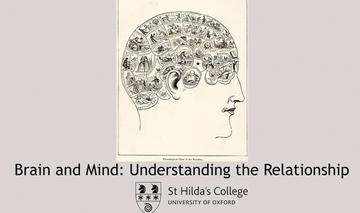Brain and Mind: Understanding the Relationship (St Hilda's College)

Our three expert speakers, will each give a talk on the subject of Brain and Mind: Understanding the Relationship: Dr Maike Glitsch from the perspective of neuroscience; Dr Ann Dowker from the perspective of psychology; and Dr Anita Avramides from the perspective of philosophy. There will then be a chaired discussion, with questions from the audience.
From thought to action by Dr Maike Glitsch
Abstract: Our brain controls virtually all aspects of our lives. Essential for our ability to actively engage with our social and physical environment is the capacity to willingly initiate and control muscle contractions, which underlie speaking, tool use and motility. This talk will look at how our brain controls movements of body parts in response to internal and external cues.
Speaker Biography: Maike Glitsch has studied the brain since her PhD and is particularly interested in how neurons communicate with each other and how non-neuronal cells and environmental factors shape this communication in health and disease. Her group uses a range of different techniques including electrophysiology and fluorescence imaging. She is reviewing editor for the ‘Journal of Physiology’ and ‘Cells’.
Suggested Reading: Any physiology or neurophysiology text book at undergraduate level, e.g. Bear, Connors and Paradiso: Exploring the Brain (enhanced paperback edition to come out March 2020; Wolters Kluwer editors) Neuroanatomy and Neuroscience at a Glance (5th edition Wiley and Blackwell)
What can the study of the brain tell us about psychology and education? by Dr Ann Dowker
Abstract: Knowledge about the brain has taught us a significant amount about how we think and learn. In particular, it has helped to teach us about the ways in which cognitive abilities and activities may themselves be made up of different components (e.g. language includes both grammar and semantics; arithmetic includes both estimation and exact calculation). Neuroscience is exerting an increasing influence on education, through the application of the findings of brain-based research to guide approaches to teaching and intervention. Unfortunately, these sometimes involve misunderstandings or oversimplified interpretations of brain studies: e,g. classifying people as ‘right-brained’ versus ‘left-brained’ thinkers or ‘visual’ versus ‘auditory’ versus ‘kinaesthetic’ learners. However, studies in neuroscience have, for example, informed the development of interventions for arithmetic: in particular through what they have taught us about the componential nature of arithmetic I will here discuss the Catch Up Numeracy intervention for primary school children with arithmetical difficulties, which is based on the principle of assessing and targeting different components of arithmetic.
Speaker Biography: Ann Dowker is University Research Lecturer at the Department of Experimental Psychology, University of Oxford and a College Lecturer in Psychology at St Hilda’s College, Oxford. She carries out research on many aspects of developmental psychology and individual differences, and especially on how these relate to education. She has a particular interest in mathematical development and mathematical difficulties. She is the lead researcher on the Catch Up Numeracy intervention project. She has published numerous academic articles and iss author of ‘Individual Differences in Arithmetic: Implications for Psychology, Neuroscience and Education’ (Psychology Press, 2005; 2nd edition, 2019)
Suggested Reading: Blakemore, S.J. & Bunge, S. (2012). At the nexus of neuroscience and education. Developmental Cognitive Neuroscience, 2, 1-5. Dowker, A. (2019). Individual Differences in Arithmetic: Implication for Psychology, Neuroscience and Education, 2nd edition. Hove: Psychology Press (Chapter 10). Howard-Jones, P. (2014). Science and society: neuroscience and education myths and messages. Nature Reviews Neuroscience, 15, 817-824.
Ways of naturalizing the mind by Dr Anita Avramides
Abstract: Most philosophers are naturalists about mind; they do not believe in immaterial (Cartesian) minds or souls. But there are many varieties of naturalism. In this talk I will outline some of the options available here and will say something about the very important contribution philosophy can make to our understanding of the relationship between brain and mind.
Speaker Biography: Anita Avramides is a Senior Research Fellow in Philosophy at St Hilda’s College in Oxford. From September 1990 until September 2020, she was the Southover Manor Trust Fellow in Philosophy at St Hilda’s. Her work is in the philosophy of mind and language. She has published extensively on the topic of other minds. Her most recent book is a volume edited with Matthew Parrott, and published by OUP in 2019, Knowing Other Minds.
Suggested Reading: A good place to start: The Philosophy of Mind: a contemporary introduction, John Heil, Routledge (1998). A somewhat more advanced introduction: Philosophy of Mind and Cognition: An Introduction (2nd ed.), David Braddon-Mitchell and Frank Jackson, Blackwell Publishing 2007




